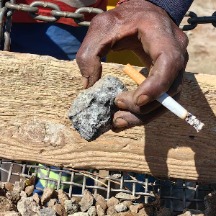In South Africa’s goldfields, especially in Johannesburg where there are approximately two hundred disused mines, informal miners are associated with violent crime and are feared by the local communities. Quite often the police are called after bodies are discovered following gun battles between gangs related to informal gold mines. Informal gold miners are known as “Zama Zamas,” which means “the ones who keep trying”.
In stark contrast, the informal diamond miners in Kimberley are largely a peaceful community. In fact, there is nothing intimidating about the community of informal diamond miners in Samaria Road, Kimberley in South Africa’s Northern Cape Province.
Very little, if any, acts of criminality are reported. Before more than eight hundred of the informal miners in Samaria Road were issued with permits to sieve diamond-rich soil, possess, and sell diamonds, the only criminal offence on their part was the possession of the ever-elusive diamond that nature endowed upon the city of Kimberley and its surroundings.
“We’re bothering no one. The soil we’re sieving through has been discarded. It’s rubbish. In actual sense, we’re deriving our livelihood from rubbish.”
This time I met with Pitso Molahlehi, the 53-year-old Lesotho-born informal miner we meet in the last instalment in this series, in his place of work. The “place of work” in this case, can be wherever hope resides. That is the hope to find a diamond, the shining stone that can fish out a man and his family from a life of want and lack overnight.
Pitso, a Sesotho name, means “a calling” and in the context of a life in a village where there is traditional leadership, it means “a gathering where the village chief calls all adults, in most cases men, to come and discuss pertinent matters of the village.”
Perhaps that is why Pitso is never short of friends. In Southern African cultures, we believe that one becomes what your name suggests. Despite him being a magnet of sorts, Pitso keeps his circle small. “Trust is very important in this trade,” he says. You have to surround yourself and work with those you trust.
Back to Pitso’s new place of work: in search of diamonds, Pitso and a few of his comrades have moved to the roadside, quite close to the relatively new middle class residential area. He said they won’t move too close to people’s houses, though. He added, however, that diamonds were all over the city of Kimberley. As he sieved, separating valuable stones from the not-so-valuable ones, he took out a stone called Kimberlite and said in his native Sesotho, “Ena re e bitsa kobo ya taemane,” which translates “This we call a blanket of a diamond.”
Ena Re E Bitsa Kobo Ya Taemane
(This We Call a Blanket of A Diamond)
(This We Call a Blanket of A Diamond)
Features




In colour, a Kimberlite has a mixture of grey and blue, and has shining particles. In order to see if it has a diamond inside, it has to be crushed. Pitso and his comrades use a small hammer or a much stronger stone to crush it open. It was unbelievable how easy it was to crush a Kimberlite.
I have come to talk to Pitso about the journey of the diamond, from being found to being sold.
“Usually, we work in teams of four. You can’t work alone because when you take a rest, another one must keep sifting through the soil,” Pitso says.
He keeps emphasising that those he works with must be the ones he trusts. Indeed, these are the ones he has known for years. They know each other’s families. They have been with each other through rain and sunshine.
One of them reminds Pitso of the conmen who cheated them in the past. “When we get phahlo, we have to get a buyer as soon as possible,” one of Pitso’s comrades says.
“Phahlo,” a Sesotho term for “an item,” is used to refer to a diamond. A buyer arrives within half an hour and makes an offer.
“It’s a take-it-or-leave-it situation. That phahlo must go. You can’t keep it on you. It’s not safe. News flies. You can’t sleep with it in your shanty. It has to go before you go to sleep. Your earnings must be deposited into your bank account that very same day,” Pitso says.
He adds that they, informal miners, have an option of selling through the diamond board, but the diamond board meets only once a month. “You can’t keep phahlo on you waiting for the diamond board to meet. Who do you trust? It’s dangerous! This thing must go, and must go as soon as possible. That’s why we trust the buyers from the street.
You get phahlo, you make a call. The buyer gets here. You get your money, you share amongst yourselves, and go to the bank. Anyway, the buyer from the street usually gives a better offer than the diamond board.”
Usually, Pitso and his team work until six o’clock in the evening. What if luck strikes just before they knock off. “We trust each other not to tell. We’re not just colleagues, we’re brothers too. We have been with each other for years. It’s trust that’s holding us together.”
I have come to talk to Pitso about the journey of the diamond, from being found to being sold.
“Usually, we work in teams of four. You can’t work alone because when you take a rest, another one must keep sifting through the soil,” Pitso says.
He keeps emphasising that those he works with must be the ones he trusts. Indeed, these are the ones he has known for years. They know each other’s families. They have been with each other through rain and sunshine.
One of them reminds Pitso of the conmen who cheated them in the past. “When we get phahlo, we have to get a buyer as soon as possible,” one of Pitso’s comrades says.
“Phahlo,” a Sesotho term for “an item,” is used to refer to a diamond. A buyer arrives within half an hour and makes an offer.
“It’s a take-it-or-leave-it situation. That phahlo must go. You can’t keep it on you. It’s not safe. News flies. You can’t sleep with it in your shanty. It has to go before you go to sleep. Your earnings must be deposited into your bank account that very same day,” Pitso says.
He adds that they, informal miners, have an option of selling through the diamond board, but the diamond board meets only once a month. “You can’t keep phahlo on you waiting for the diamond board to meet. Who do you trust? It’s dangerous! This thing must go, and must go as soon as possible. That’s why we trust the buyers from the street.
You get phahlo, you make a call. The buyer gets here. You get your money, you share amongst yourselves, and go to the bank. Anyway, the buyer from the street usually gives a better offer than the diamond board.”
Usually, Pitso and his team work until six o’clock in the evening. What if luck strikes just before they knock off. “We trust each other not to tell. We’re not just colleagues, we’re brothers too. We have been with each other for years. It’s trust that’s holding us together.”
Advertisers | Contact Us | Events | Links | Media Kit | Our Company | Payments Pier
Press Room | Print Cover Stories Archives | Electronic Issues and Talk Radio Archives | Writer's Guidelines






